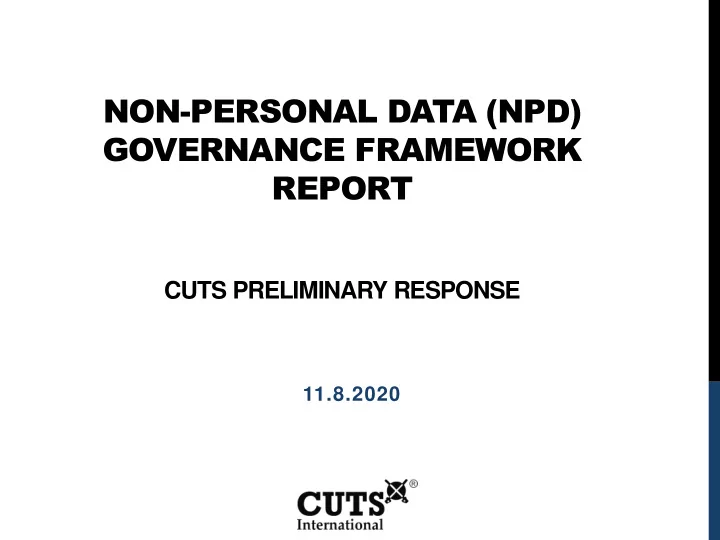

NON-PERSONAL DATA (NPD) GOVERNANCE FRAMEWORK REPORT CUTS PRELIMINARY RESPONSE 11.8.2020
REGULATORY HARMONISATION • Lack of clarity on issues to be addressed by NPD governance framework that existing regulatory framework cannot address. • Overlap in definition of NPD with PD (inferred data and mixed datasets). • Governance and regulation of mixed datasets (containing both PD and NPD) and thus overlap between two separate regulatory authorities are not appropriately covered. For example, e-commerce. • Overlap in jurisdiction of other sectoral and sector neutral regulators such as e-commerce, competition, consumer protection, finance. A whole of government approach may be a way forward. • Need narrowly defined regulation, MoU between regulators, and Regulatory Impact Assessment for NPD Regulatory Authority (NPDA). 2
DATA SHARING • Lack of evidence-based approach in the report to address abuse of dominance. Competition Commission of India (CCI) is responsible to address competition issues. • Among other objectives, data sharing is illustrated as a means to encourage competition. Given the nature of data, blanket assertion that all data creates entry barrier is fallacious. • No clarity on principles by which NPDA can direct mandatory data sharing. • Why mandating data sharing is an appropriate alternative to creating voluntary incentives for data sharing is not comprehensively discussed. • Lack of rationale on allowing raw data to be shared without remuneration or distinguishing between raw and value added data. • Need clarity on the role of NPDA and CCI. Empower CCI to check abuse of dominance in data markets. Empirical Assessment of NPD sharing and its impact on MSMEs and start-ups 3
CONSUMER EMPOWERMENT • Lack of appropriate architecture to empower data principals (DP) to exercise their rights. • Consent from DP on data anonymisation and its usage, however, CUTS survey on user perception of privacy revealed that consumers do not read privacy policies, mostly due to their length, legalese and language. Simplified consent mechanism needs be formulated. • Lack of clarity on exercise of rights by DP, particularly, data community rights and their relationship with data trustees. • Lack of clarity on grievance redress mechanisms for DP. • Need consumer focus and adequate mechanisms on consumer welfare, transparency and accountability. 4
WAY FORWARD • Need for better clarity on scope of governance framework. • Ex-ante cost-benefit analysis and further deliberations with key stakeholders including start-ups need to be engaged while framing regulation for NPD. • Need for adequate inclusion of consumer interests and grievance redressal. • Regulatory harmonisation is fundamental, as anything adversary may defeat the objective of the policy. Whole of government approach can be a way forward. 5
THANK THANK YOU OU 6
FURTHER READINGS https://cuts-ccier.org/pdf/CUTS- CIRC_Submission_to_Competition_Law_Review_Committee. pdf https://cuts-ccier.org/pdf/cuts-comments-on-draft- competition-amendment-bill-2020.pdf https://cuts-ccier.org/pdf/survey_analysis-dataprivacy.pdf https://cuts-ccier.org/pdf/submission-pdpb-2019.pdf 7
Recommend
More recommend